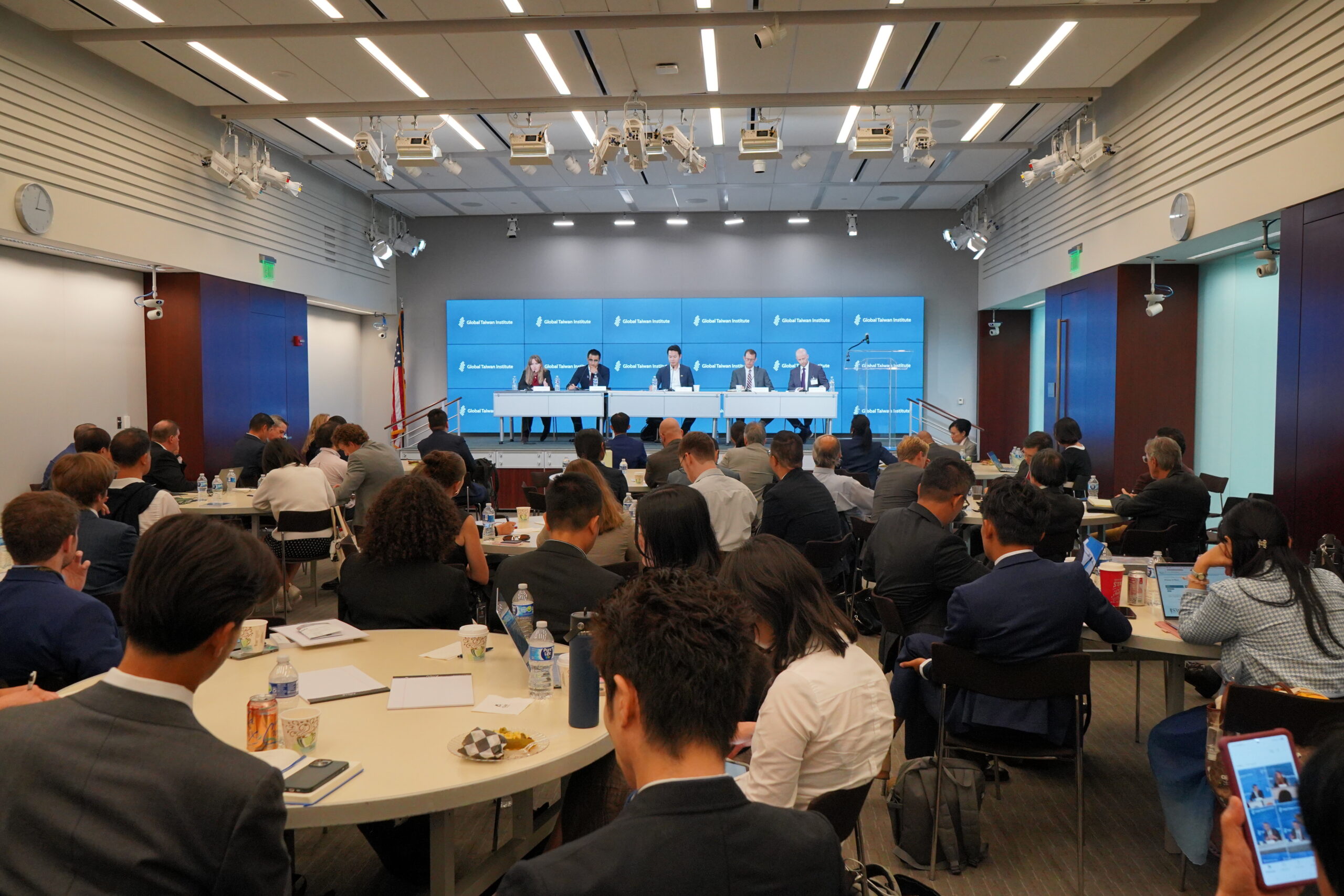On October 1, 2025, the Global Taiwan Institute (GTI) convened its 9th Annual Symposium, “A New Era for U.S.–Taiwan Relations in a Changing International System.” The full-day conference brought together distinguished policymakers and experts for keynote speeches, panel discussions, and in-depth dialogues on the future of US–Taiwan relations. Topics ranged from policy trends in Washington, Taipei, and Beijing; to Taiwan’s evolving international partnerships; trade and technology policies; and pressing issues of defense and security in the Indo-Pacific. More than 100 participants attended the symposium, underscoring the growing public interest in Taiwan’s role in global affairs.
The event kicked off with an opening speech by GTI Chair of the Board of Directors and President Jennifer Hu. Next, Taiwan Representative to the United States Ambassador Alexander Yui Tah-ray (俞大㵢) delivered a welcome keynote speech, highlighting the continuing importance of Taiwan in Washington policymaking. Amb. Yui particularly praised strengthening US-Taiwan economic ties: “[O]ur shift in global investment strategy that has resulted in a strong trend of Taiwanese companies aiming for a bigger presence in the United States. We believe this aligns perfectly with the Trump administration’s economic goals.”
The first two panels in the morning addressed a broader picture of US-Taiwan relations, and of Taiwan’s foreign partnerships. At the first panel, GTI Senior Non-Resident Fellow Ann E. Kowalewski, Chin-Fu Hung (National Cheng-Kung University), and Willy Wo-Lap Lam (The Jamestown Foundation) discussed policy trends in Taiwan, the United States, and China. They stressed the increasing focus on trade policy in Washington, as well as the seriousness of Beijing’s efforts at infiltration in Taiwan. The second panel, joined by GTI Senior Programs Manager Adrienne Wu, GTI Non-Resident Fellow Thomas Shattuck (Perry World House), Yuki Tatsumi (Institute for Indo-Pacific Security), and Leland Lazarus (Lazarus Consulting), addressed Taiwan’s international connections–specifically spotlighting partnerships with Japan, the Philippines, and Latin America.
During the lunch break, Taiwan’s Minister of Foreign Affairs Chia-Lung Lin (林佳龍) presented a recorded keynote speech, underscoring that Taiwan plays a key role as a trusted ally in areas like security, economy, and technology. “Taiwan’s specialized chip manufacturing could accelerate America’s AI development, and US quantum computing research would complement Taiwan’s expertise in advanced materials,” said Lin.
Two panels in the afternoon shed light on two specific issues: trade and technology policies, and security challenges in the Indo-Pacific. In the third panel, former Taiwan Deputy Minister of Economic Affairs Chern-Chyi “C.C.” Chen (陳正祺), GTI Senior Non-Resident Fellow Riley Walters (Hudson Institute), and Libby Lange (Special Competitive Studies Project), emphasized the latest developments in trade and technology policies in the United States and Taiwan–especially addressing Taiwan’s strategies in response to US tariffs, and the artificial intelligence (AI) boom.
The last panel highlighted the challenges for Washington and Taipei in securing a peaceful Indo-Pacific region. The panelists, consisting of RADM Michael Studeman (USN, ret.), Kai-Chieh Hsu (Taipei District Court), Alison O’Neil (Institute for the Study of War), and Jaime Ocon (Taiwan Security Monitor), articulated several pressing issues: including PRC gray-zone intimidation against Taiwan’s Air Defense Identification Zone (ADIZ), Taiwan’s military preparedness and resilience, and countermeasures against PRC political warfare and intelligence work.
The program concluded with an in-depth dialogue between two senior former government officials, who both held the position of Assistant Secretary of Defense for Indo-Pacific Security Affairs: Ely Ratner (2021–2025), and Wallace ‘Chip’ Gregson (2009–2021). The discussion was moderated by GTI Director John Dotson. Both Ratner and Gregson called for stronger US support to assist allies in deterring PRC threats. Dr. Ratner stressed that “one of the most important things the United States can do to protect its own interests in the Indo-Pacific, and thereby globally, is to help Taiwan strengthen its own defenses and resilience.”
The Global Taiwan Institute extends its sincere gratitude to its co-founders, board members, advisory board, and dedicated staff for making the GTI 2025 Annual Symposium possible, as well as to every participant who shares a commitment to strengthening US-Taiwan relations.
This year’s symposium underscored GTI’s mission to foster informed dialogue, bridge perspectives, and advance understanding of Taiwan’s role in the evolving international system. As global dynamics continue to shift, GTI remains dedicated to serving as a trusted platform for policy research, public engagement, and collaboration between Taiwan, the United States, and the broader international community.
Global Taiwan Institute is a 501(c)(3) non-profit educational institute based in Washington, DC, dedicated to insightful research on policy issues regarding Taiwan and its place in the world.









